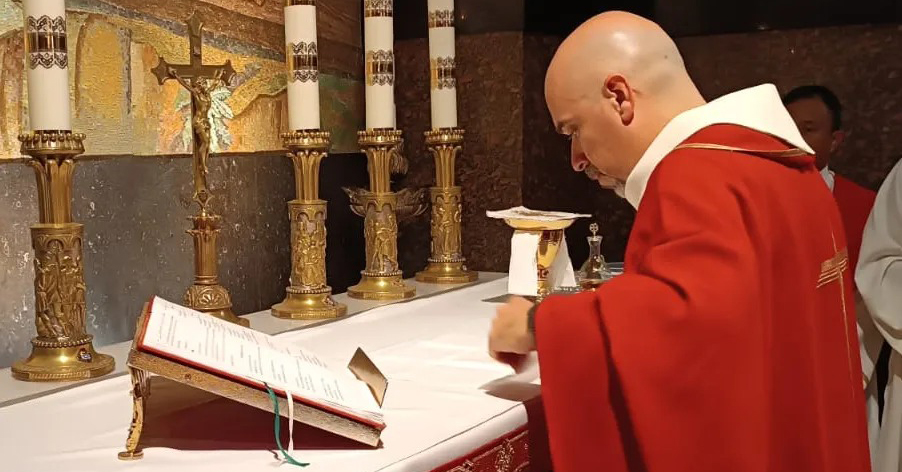
23 Oct October 2023 Reflection – Michael McFarland SJ
Earlier this month we were putting the finishing touches on our eagerly anticipated trip to the Holy Land. We were to visit the Biblical Institute’s center in Jerusalem and then tour the holy sites there, around the Jordan, in Galilee and in Bethlehem, led by Fr. Josef Briffa, SJ, the director of the center and an acclaimed Biblical scholar. Then we were hit by the shocking news of the brutal attacks on Israel and the widespread kidnappings and killings, including many innocent women, children and the elderly. The bitter fighting continues in both Israel and Gaza, bringing even more death and destruction.
Eric Clayton, the Deputy Director of Communications for the Jesuit Conference of Canada and the United States, captured what many of us have been feeling in a recent post:
Kidnappings, murders and the fear endured by families huddled in dark rooms for hours. Other families unable to escape, unable to call for help, unable to access medical care as rockets rain down. Children, the elderly, the most vulnerable caught in the crossfire. These things should not leave us feeling apathetic. The wanton violence and pain inflicted upon any member of our human family should leave us feeling.
…. Anger at injustice. Weariness at ongoing violence. Sorrow for the loss of life. Raw at the seemingly inevitable cycle, the tit-for-tat nature of conflict. Determined to create something new, something better, something that transcends the complexities of history.
He goes on to ask, “What can we even pretend we’re capable of accomplishing against this great wave of evil and darkness?” His answer is this:
We can continue to stare evil and suffering and pain straight on. That’s the nature of the First Week of the Spiritual Exercises. Ignatius tells us this: Don’t look away. The brokenness of our world, the disorder and chaos, the rampant greed and the proliferation of violence — this is not what God dreams. This is not what God intends, our God who delights in nothing more than the full flourishing of creation.
The reference to the First Week of the Spiritual Exercises is telling. In it Ignatius insists that we cannot begin to build a relationship with Jesus Christ until we confront the pervasive power of sin within us and around us. But it is always in the context of Christ on the Cross, the ultimate sign of God’s love and mercy, which heals every sin and division. We must be beacons of hope in a world of darkness, working tirelessly for peace and reconciliation, confident that this is God’s work, and therefore it will not be in vain. As Pope Francis said in response to the attacks on Israel and the subsequent fighting, “Let it be understood that terrorism and war bring no solution but only death and the suffering of many innocent people. War is a defeat. Every war is a defeat. Let us pray that there be peace in Israel and in Palestine.”
This work of reconciliation is an essential part of the mission of the Biblical Institute’s Jerusalem Center, especially through its collaboration with Hebrew University. It is also a central focus of the Cardinal Bea Centre for Judaic Studies at the Gregorian University, with its Licentiate in Judaic Studies and Jewish-Christian Relations. This is one of several efforts in interreligious and intercultural dialogue at the Gregorian University, the Biblical Institute and the Oriental Institute, including Christians, Jews and Muslims. A particularly exciting new development is a joint proposal by the Cardinal Bea Centre and the Biblical Institute to create a Professorship in Rabbinic Literature, which will bring Christian and Jewish scholars together to study the rich, centuries-long Jewish reflection on Scripture and theology in order to deepen our understanding of and appreciation for our common religious tradition and to counter the antisemitism that tragically still exists in the Catholic Church and elsewhere. At the Gregorian University Foundation, we have been asked, in collaboration with other funding organizations, to help raise funds to endow the Professorship, which ultimately will include several senior faculty, post-docs and graduate students. These efforts are one part of the long-term work of building the mutual understanding and respect that is the only solid foundation for true peace. In the meantime we will continue to pray ardently for an end to the fighting, for the victims, and for the welfare of all the innocent people who are in harm’s way.
Michael C McFarland, SJ
President, Gregorian University Foundation



